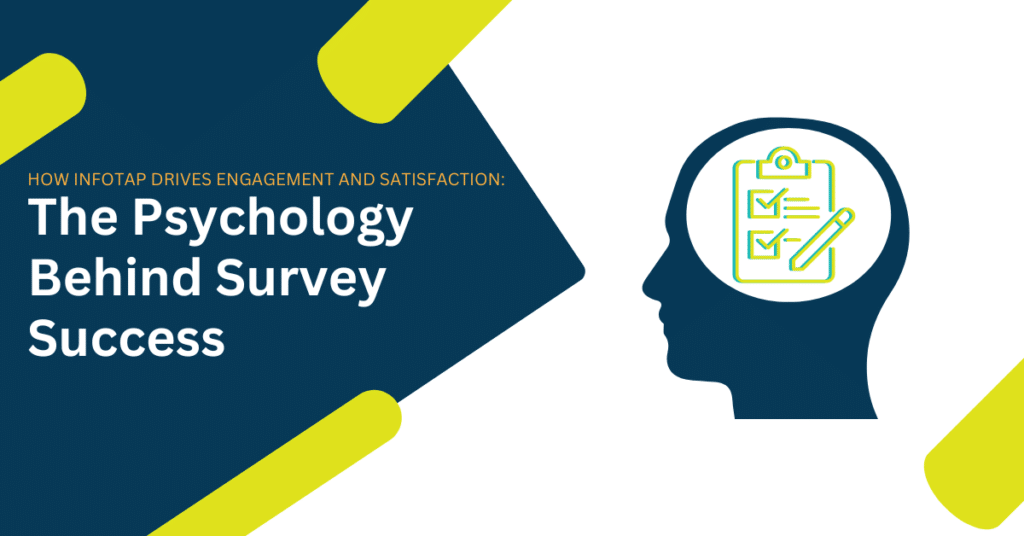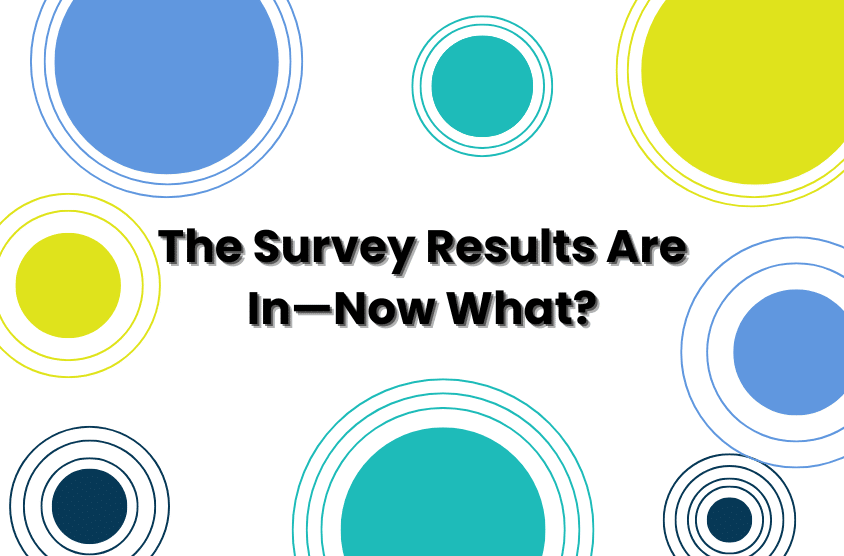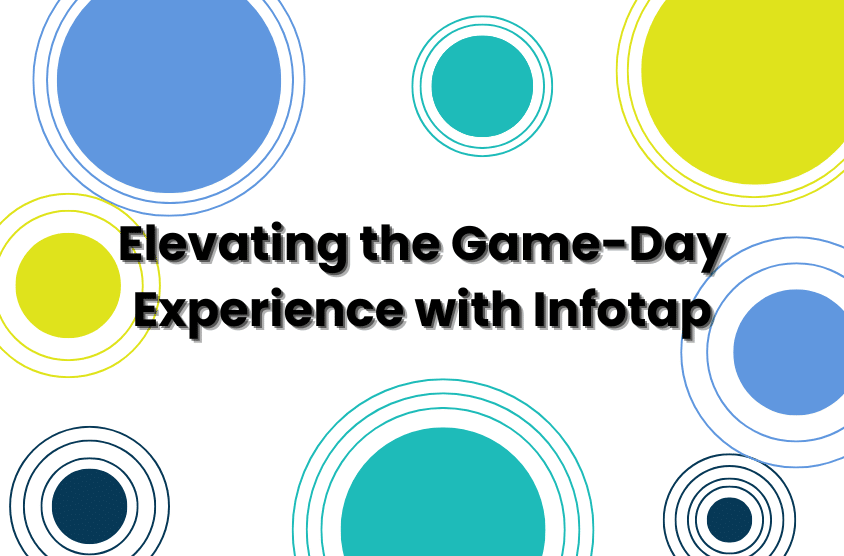
Table of Contents
Surveys have long been an essential tool for gathering feedback, understanding customer preferences, and improving products or services. However, merely collecting responses doesn’t always ensure that the data is valuable or representative. To truly optimize the quality of survey responses, companies must delve into the psychology behind survey satisfaction. Infotap, a gamified survey software, has refined its understanding of how participants think, feel, and behave when taking surveys. This article explores what Infotap has learned about the psychology of survey satisfaction and how these insights can enhance survey engagement and effectiveness.
The Role of Psychology in Survey Responses
Understanding why people respond to surveys, how they process questions, and what motivates them to provide thoughtful answers is essential for improving survey outcomes. Infotap has uncovered several psychological factors that influence survey satisfaction:
Cognitive Factors Influencing Survey Participation
Cognitive load theory suggests that people have a limited capacity for processing information. When a survey is too complex, respondents are likely to feel overwhelmed, leading to incomplete or careless answers. Surveys that are clear, concise, and logically structured help reduce cognitive load and improve the quality of responses.
Emotional Drivers in Survey Satisfaction
Emotions significantly influence how participants approach surveys. Positive emotions, such as feeling valued or appreciated, can increase engagement, while negative emotions, such as frustration with the survey format or content, can lead to lower completion rates. Infotap has learned that appealing to respondents’ emotions by crafting thoughtful, empathetic questions fosters a sense of connection and improves survey satisfaction.
Behavioral Aspects in How People Engage with Surveys
Human behavior is shaped by habits and cues. For instance, many respondents are more likely to complete a survey if they feel that their participation will make a tangible difference. Understanding these behavioral cues helps Infotap design surveys that prompt more meaningful responses.
What Infotap Has Learned from Analyzing Survey Satisfaction
Infotap’s data-driven approach to survey satisfaction has uncovered valuable insights into respondent behavior. By studying thousands of surveys across diverse industries, Infotap has identified key psychological patterns that affect how participants engage with and complete surveys.
How Infotap Collects and Analyzes Data
Infotap uses advanced analytics to monitor completion rates, response times, and feedback quality. By analyzing this data, Infotap can pinpoint pain points in the survey process and adjust survey design accordingly.
Key Insights from Infotap’s Research
Some of the most significant findings from Infotap’s research include the importance of personalization, the role of emotional engagement, and the impact of simplicity in survey design. These insights have allowed Infotap to fine-tune its platform to maximize user satisfaction.
Emotional Engagement in Survey Design
Emotions play a critical role in how participants experience surveys. A survey that feels impersonal or tedious can lead to negative emotions, such as frustration or apathy. On the other hand, a survey that resonates emotionally can drive higher engagement and more thoughtful responses.
How Emotions Impact Survey Completion Rates
Respondents are more likely to complete surveys that make them feel appreciated. A simple thank-you message at the start, or questions that acknowledge the respondent’s effort, can significantly boost completion rates.
Positive and Negative Emotions in Feedback
Infotap has learned that respondents are more likely to provide detailed feedback when they have strong positive or negative emotions about a product or service. Neutral feelings often result in less engaged or shorter responses, so surveys that evoke an emotional response tend to yield richer data.
Techniques to Foster Positive Emotional Engagement in Surveys
Infotap incorporates several techniques to foster positive emotional engagement, such as using friendly, conversational language and offering small rewards for participation. These strategies help make the survey experience more enjoyable and satisfying for respondents.
The Importance of User-Friendly Design in Satisfaction
A survey’s design can significantly impact respondent satisfaction. Infotap has found that when surveys are too long, complicated, or poorly formatted, respondents are more likely to abandon them or provide low-quality answers.
Cognitive Load Theory and Survey Design
Cognitive load theory highlights the importance of reducing the mental effort required to complete a survey. Infotap applies this theory by keeping surveys simple and intuitive, which minimizes respondent fatigue and increases satisfaction.
How Infotap Optimizes the User Experience
Infotap’s platform is designed to make surveys as user-friendly as possible. This includes features like mobile optimization, clear instructions, and progress indicators, all of which enhance the respondent’s experience and satisfaction.
The Role of Simplicity in Survey Satisfaction
Simplicity is key to maintaining engagement. Surveys that are easy to navigate, with straightforward questions and a clear structure, encourage respondents to complete the survey fully and thoughtfully.
The Power of Personalization in Surveys
Personalization is another important factor in survey satisfaction. Respondents are more likely to engage with a survey that feels tailored to their experiences and preferences.
Why Personalized Surveys Boost Engagement
Personalized surveys show that the company values the respondent’s unique input. Infotap’s research shows that when surveys are personalized, participants feel more connected to the process, leading to higher response rates and more detailed feedback.
Tailoring Questions Based on Previous Responses
Infotap uses “skip logic” to create personalized survey journeys, where questions change based on a respondent’s previous answers. This approach keeps respondents engaged and ensures that their feedback is more relevant.
How Infotap Implements Personalized Survey Journeys
Infotap’s platform allows businesses to easily customize surveys for different segments of their audience. By personalizing surveys, companies can gather more actionable insights and improve overall satisfaction.
Reducing Survey Fatigue: Best Practices from Infotap
Survey fatigue is a common challenge that can negatively impact response rates and data quality. Infotap has developed several strategies to minimize fatigue and keep respondents engaged.
Signs of Survey Fatigue and Its Impact on Results
Survey fatigue occurs when respondents feel overwhelmed by the length or frequency of surveys. Signs of fatigue include skipping questions, providing minimal responses, or abandoning the survey altogether.
How to Keep Surveys Short, Relevant, and Effective
Infotap recommends keeping surveys as short as possible while still gathering the necessary data. Focus on asking only the most important questions, and use logic to hide irrelevant ones based on previous answers.
The Role of Rewards and Incentives in Survey Satisfaction
Offering incentives can boost survey participation, but it’s important to use them wisely. Infotap has studied the psychological effects of rewards and developed best practices for using incentives to improve survey satisfaction without compromising data integrity.
Psychological Theories Behind Reward Systems
The theory of operant conditioning suggests that people are more likely to repeat a behavior when it is followed by a reward. In the context of surveys, offering incentives can increase participation rates, but it can also lead to biased responses if not done carefully.
Best Practices for Offering Survey Incentives
Infotap has found that offering small, non-monetary incentives, such as discounts or access to your Wi-Fi, works best. These rewards encourage participation without overly influencing responses.
How Infotap Balances Genuine Feedback with Incentivized Responses
Infotap emphasizes transparency when offering incentives. Clearly communicating that honest, thoughtful feedback is more valuable than simply completing the survey helps ensure that the data collected is reliable.
Social Proof and Its Influence on Survey Participation
Social proof, the idea that people tend to follow the actions of others, plays a powerful role in survey participation. Infotap has found that leveraging social proof can significantly enhance survey engagement.
The Psychology of Social Proof in Digital Environments
People are naturally influenced by the behavior and opinions of others, especially online. Seeing that others have participated in a survey or reading testimonials from previous respondents can increase the likelihood of participation. Infotap has discovered that incorporating social proof elements into surveys creates a sense of validation and encouragement, prompting more people to engage.
How Peer Influence Impacts Survey Engagement
Peer influence extends beyond initial participation and can also affect the depth and quality of responses. Infotap has observed that when respondents see their peers providing thoughtful, detailed feedback, they are more likely to invest effort into their own responses. This social dynamic can drive higher-quality data collection.
The Impact of Timing on Survey Success
The timing of survey distribution plays a crucial role in both response rates and satisfaction. Infotap has conducted extensive research on how timing affects survey engagement and developed data-driven strategies to optimize this aspect.
Best Times to Send Surveys for Maximum Engagement
Infotap’s analysis shows that surveys sent during specific times of the day or week have higher response rates. For example, sending a survey early in the morning or late in the evening can increase engagement, as respondents are less likely to be distracted by work or other responsibilities.
How Timing Affects Survey Satisfaction and Completion
Beyond response rates, timing can also impact how satisfied respondents are with the survey process. Infotap has found that sending surveys shortly after a relevant event, such as a customer service interaction or purchase, leads to higher satisfaction levels. Participants are more likely to provide accurate and thoughtful feedback when the experience is fresh in their minds.
Infotap’s Data-Driven Timing Strategies for Optimal Results
Infotap has developed algorithms that suggest optimal survey timing based on previous response patterns and industry benchmarks. These insights allow Infotap to ensure its clients’ surveys are sent at the most effective times, resulting in higher participation rates and more meaningful feedback.
Feedback Loops and Building Trust in Surveys
Building trust with respondents is critical for survey success. Infotap has found that creating feedback loops—where respondents see the impact of their feedback—significantly enhances their experience and encourages future participation.
How Feedback Loops Enhance Survey Credibility
When respondents know their feedback is listened to and acted upon, they are more likely to engage meaningfully. Infotap advises companies to share results or communicate changes made based on survey feedback with participants. This transparency strengthens trust and demonstrates that the survey process is a valuable tool for improvement, not just a formality.
Infotap’s Approach to Closing the Loop with Participants
Infotap encourages businesses to follow up with respondents after the survey concludes, thanking them for their input and explaining how their feedback will be used. This can take the form of a personalized email or a public update. Closing the loop creates a positive feedback cycle, enhancing future survey participation.
Trust-Building Strategies to Increase Survey Satisfaction
Infotap has identified several strategies to build trust in the survey process. These include offering transparency about how data will be used, ensuring anonymity where appropriate, and providing participants with updates on the results. By fostering a sense of openness, Infotap helps companies maintain high levels of satisfaction and trust with their survey respondents.
Using Data Analytics to Improve Survey Satisfaction
Infotap leverages data analytics to continuously refine the survey experience. By analyzing response behavior, Infotap can identify areas for improvement and optimize surveys for greater satisfaction.
The Role of Analytics in Understanding Survey Behavior
Data analytics provides valuable insights into how respondents interact with surveys. Infotap analyzes metrics such as completion rates, time spent on each question, and response quality to understand what drives satisfaction and what causes frustration. These insights enable Infotap to make data-driven adjustments that improve the overall survey experience.
How Infotap Uses Data to Refine Surveys
Infotap’s platform tracks and evaluates every aspect of the survey process, from question design to distribution timing. By applying machine learning models, you can predict respondent behavior and adjust survey features to maximize satisfaction and engagement.
Predicting Future Survey Trends Through Data Insights
Through its vast collection of survey data, Infotap can forecast emerging trends in survey design and satisfaction. For instance, the increasing use of mobile devices for survey completion has prompted Infotap to focus on mobile-friendly designs. As survey-taking behaviors evolve, Infotap’s capabilities ensure that its clients stay ahead of the curve.
Future Trends in Survey Psychology
As technology and consumer behavior continue to evolve, so too will the psychology of survey satisfaction. Infotap is at the forefront of identifying and adapting to these emerging trends.
Emerging Trends in Digital Surveys
One key trend is the rise of conversational surveys, where questions are framed in a more interactive, dialogue-like format. This approach can help make the survey experience feel less transactional and more engaging. Infotap has already begun integrating conversational elements into its survey designs to keep pace with this trend.
The Role of AI and Machine Learning in Predicting Survey Satisfaction
AI and machine learning are transforming the way surveys are designed and delivered. Infotap uses these technologies to predict respondent behavior and optimize surveys in real-time. For example, AI can identify when a respondent is likely to abandon a survey and adjust the question flow to re-engage them.
How Infotap Plans to Stay Ahead in Survey Innovation
Infotap is committed to staying at the cutting edge of survey technology by continuously researching new psychological insights and incorporating them into its platform. The company is exploring new ways to integrate AI-driven personalization, real-time analytics, and gamification to make surveys more engaging and satisfying.
Conclusion
Understanding the psychology behind survey satisfaction is essential for creating surveys that not only gather valuable data but also leave respondents feeling positive about the experience. Infotap has leveraged its experience and data-driven insights to master the art of survey design, ensuring that its clients can create surveys that resonate emotionally, reduce cognitive load, and build trust with respondents.
By focusing on personalization, user-friendly design, and strategic timing, Infotap has consistently improved survey satisfaction across a range of industries. As the landscape of digital surveys continues to evolve, Infotap is well-positioned to lead the way in developing innovative, psychologically sound survey solutions that keep respondents engaged and satisfied.
FAQs
- What psychological factors influence survey satisfaction?
Survey satisfaction is influenced by cognitive load, emotional engagement, behavioral cues, and trust. Keeping surveys simple, personalizing the experience, and building trust with respondents are key strategies for improving satisfaction. - How does Infotap improve survey completion rates?
Infotap uses data analytics, personalized survey journeys, and optimized timing to increase survey completion rates. By reducing survey fatigue and tailoring questions to the respondent, Infotap ensures higher engagement and satisfaction. - What role does emotional engagement play in survey satisfaction?
Emotional engagement is critical to survey success. Respondents are more likely to complete surveys and provide thoughtful feedback when they feel valued and appreciated. Infotap enhances emotional engagement through friendly language and rewarding experiences. - How can personalization improve survey results?
Personalization makes respondents feel like their input is valued, leading to more meaningful feedback. Infotap uses branching logic to tailor surveys based on previous responses, ensuring that each respondent’s experience is relevant and engaging. - What are the best practices for reducing survey fatigue?
To reduce survey fatigue, keep surveys short, relevant, and to the point. Use features like progress indicators and avoid asking redundant or overly complex questions. Infotap’s approach focuses on minimizing cognitive load to keep respondents engaged. - How does timing affect survey satisfaction?
Sending surveys at the right time is crucial for maximizing response rates and satisfaction. Infotap’s data-driven approach identifies the optimal times for survey distribution, ensuring that surveys are sent when respondents are most likely to engage.
Ready to reduce survey fatigue and improve the quality of your data? Schedule a demo and discover how its innovative features can help you create engaging, relevant surveys that keep respondents motivated from start to finish. Experience the benefits of higher completion rates and more reliable insights for your next survey project.







